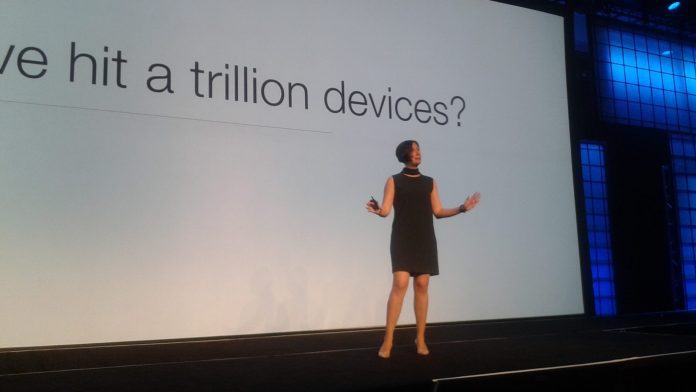SKT Labs founder explains why the IoT is so hard
Santa Clara, Cali. – The internet of things (IoT) holds many opportunities as more and more devices connect to each other each day. But it also gives rise to a host of unresolved challenges. During a keynote presentation at Arm TechCon 2017, Journalist and Founder of SKT Labs Stacey Higginbotham discussed how to address some of the main issues the industry is facing and how solving them could potentially unlock the potential of a trillion smart connected devices.
Higginbotham began by envisioning what a world of a trillion sensors might look like, particularly within the realms of energy, healthcare, agriculture, financial markets and insurance shifts. Touching on agriculture, Higginbotham noted how computer vision is being applied to agriculture to allocate pesticides, providing the precise amount of pesticide exactly where it is needed.
“This is great for obvious costs reasons. This is why the farmers are buying it. From an environmental perspective though, it’s great because we don’t get fertilizer run off or as much. We get less pesticides on our food. These are the sort of things that are becoming possible.”
Despite the advantages attached to IoT, it also produces a plethora of unanswered questioned, including who’s making decisions based on the data being gathered and who gets to decide what matters?
For example, recently John Hancock, a life insurance company, announced it would make discounted Apple Watches available to life insurance policyholders enrolled in its Vitality program. So long as Vitality members exercise regularly for two years, they will be able to keep the device for free. But, Higginbotham noted, who is to say exercise is the right measure for longevity, especially as employers look to wearable data to assess employees? “These sorts of correlations are going to become problematic if we don’t start questioning and thinking about them. Who gets to decide what matters and do we have the studies to back that up?”
In addition to a host of unanswered questions in a world of a trillion IoT devices are a number of unresolved challenges pertaining to software development, security, energy consumption and user interfaces. “This is really complicated. This is not something our engineering or compute minds can think about. This is a very dynamic system and we are going to have to get comfortable with that kind of dynamic system if we actually want to engage with the IoT,” Higginbotham said.
Addressing the issues pertaining to software development, Higginbotham said she sees great opportunity in code and computer modeling. Viv, for instance, a company purchased by Samsung, specializes in machine learning and A.I. that connects APIs for people. “When you have a trillion sensors, devices or a trillion anything, we are going have to put more automation, and we are going to have to put our trust in that automation. And one of the ways to do that is to make coding less hard; the other way is to make more automation. I think we are going to have to do both.”
Moving onto cyber vulnerabilities, old security models are no longer sufficient for the IoT, especially with regards to bad data. What is needed, according to Higginbotham, is a trusted ecosystem using blockchain technology, training people how to behave with computers and marrying OS with hardware.
Energy consumption is another major issues with respect to IoT, not just because web connected devices consume a lot of energy, but because of the human effort needed to update these devices. Consequently, Higginbotham suggested looking into alternative forms of energy harvesting, such as organic methods in which sweat is turned into power.
Turning to people, Higginbotham spoke about the challenge of how humans interact with a trillion devices. Overcoming the lack of standards, or figuring out how to deal with multiple standards, will be necessary in addressing this feat. “We are going to have to invest in A.I.s. We are going to have to think about forgetting the standards and taking it up several levels, and mediate our interactions with computers through artificial intelligence; through these personal assistants. I’m really hopeful we will only have to pick one.”
Ending on a nod to the future, Higginbotham concluded on how tech revolutions don’t happen overnight and that we have to guide the ecosystem in the direction we want. “We have some very real issues facing us with climate change, food scarcity, poverty and their are ways big data can actually help us.”

